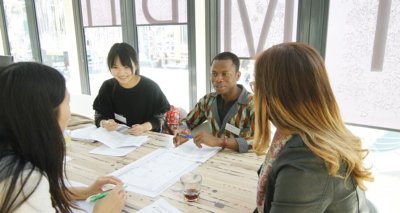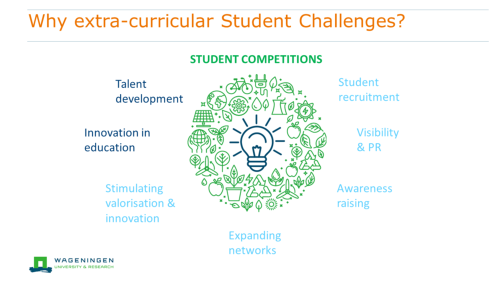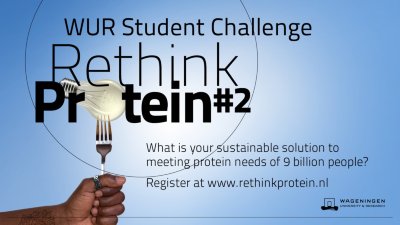Blog by Cassandra Tho, researcher at the Education and Learning Sciences chair group
Following the successful webinars by TU Delft, University of Twente and TU Eindhoven, the fourth webinar in the series on Challenge-based Education at 4TUs focused on Challenge-Based Learning (CBL) in Wageningen University. On the 19th of May, 4TU.CEE Chairman, prof dr. Perry den Brok opened the webinar and welcomed over 30 participants to the webinar.
In this webinar, WUR colleagues shared their experiences on the current state-of-the-art of CBL in Wageningen University and the organisation of extra-curricular challenges. Attention was also paid to a parallel course that students can take in which they work on their personal and professional development in relation to the (extra-curricular) challenge they are participating in. The webinar session was moderated by dr. Renate Wesselink.
Current state-of-art of CBL in Wageningen University
 In his opening presentation, Perry introduced the various Challenge-Based Learning (CBL) initiatives that are currently taking place in Wageningen University. A few variations of CBL exist within WUR, for example:
In his opening presentation, Perry introduced the various Challenge-Based Learning (CBL) initiatives that are currently taking place in Wageningen University. A few variations of CBL exist within WUR, for example:
- Inter-curricular challenges within programmes, like the Academic Consultancy Training (ACT), the MOOC challenge, iGEM competitions connected to courses;
- Challenges organised by the Alliance of UU-TU/E-WUR-UMCU where students can receive credits e.g. COVID challenge, BITT challenge;
- Extra-curricular challenges organised by the WUR Student Challenges team where students do not get any credits for participation, like ReThink Protein, Urban Greenhouse Challenge.
A Delphi study is currently being conducted by Cassandra Tho, to look into these various forms of CBL present at WUR. This study aims to investigate what CBL looks like in Wageningen University to reach a common understanding of CBL, develop a shared framework and thereby inform the future organisation of challenges.
Wageningen University is making policy plans to incorporate CBL in education and is currently exploring for example if challenges can be part of, or carried out instead of, internships/theses and how achievements/learning in extra-curricular challenges can be recognized in diplomas.
Extra-Curricular Challenges in WUR (e.g. ReThink Protein)
One of the new and unique aspects of CBL in Wageningen University is the introduction of extra-curricular challenges that are always commissioned by a real-life external partner and comes with a competition element for student teams. Rio Pals from the WUR Student Challenges team explained the ‘why’, ‘how’, ‘what’ and ‘who’ that are behind the organization of such a ‘WUR Signature Challenge’. Some examples of WUR signature Challenges includes the Urban Greenhouse Challenge as well as the current on-going second edition of ReThink Protein. These challenges are organised by Rio and her team, and attract participants from all over the world (352 participants from 34 countries), both students as well as other external partners who contribute or are involved as experts or coaches.
 In these extra-curricular challenges, students participate on their own accord (usually alongside their regular study programme as well) and they work in multi-disciplinary and multi-cultural teams. While these challenges are quite open-ended, there are many milestones and activities embedded within the organisation of the challenge that stimulate students to share, collaborate and learn with and from other teams, coaches, stakeholders and business partners. The student teams present their developed solution or innovative idea to the commissioner in a grand finale, leading to one winning team.
In these extra-curricular challenges, students participate on their own accord (usually alongside their regular study programme as well) and they work in multi-disciplinary and multi-cultural teams. While these challenges are quite open-ended, there are many milestones and activities embedded within the organisation of the challenge that stimulate students to share, collaborate and learn with and from other teams, coaches, stakeholders and business partners. The student teams present their developed solution or innovative idea to the commissioner in a grand finale, leading to one winning team.
The presentation was followed by a Q&A with participants, which addressed practical aspects related to organising such an extra-curricular challenge. Rio herself was also interested in the audiences’ take on having a competition element in CBL - is a competition element a key distinctive characteristic of CBL? - and it also generated quite a discussion around the topic. Some participants argue that the competition element is key to a challenge, while others were doubting if the competition element would be helpful to peer learning as groups might not want to share their work or ideas if it is a competition.
The Student Challenge Parallel Course: Facilitating students’ personal and professional development during a challenge
 Dr. Yvette Baggen, assistant professor at the Education and Learning Sciences group at WUR, talked about the parallel course ‘Student Challenge Learning Journey’. This is a course that students can opt to take on alongside their participation in the WUR extracurricular challenges. This course is running for the first time and is available to students who are participating in the current edition of the ReThink Protein Challenge. The course aims to enable students to capitalise on their learning experiences while participating in an extracurricular challenge (i.e., offering them up to 12 ECTS). Learning gains for students contribute to their future, personal and professional development. Students receive individual coaching sessions in which they discuss their learning goals and come up with action plans on how to meet those goals while working – with their student team – on the extracurricular challenge. Intervision moments are also organised for participating students. This way they can meet with their peers to learn from one another as well as give each other peer feedback. Additionally, depending on the wishes of the cohort or patterns observed by the team of coaches, workshops are being organised to introduce concepts to students to help them with their learning goals. Throughout the course, students are stimulated to reflect on their performance in their extra-curricular challenge in relation to their own learning goals, learning experiments and feedback. Yvette provided a sneak peek into her role as a coach and reflected that the coaching sessions enabled her to have personal, in-depth discussions with students and also allowed her to reflect on her own educational and teaching practices.
Dr. Yvette Baggen, assistant professor at the Education and Learning Sciences group at WUR, talked about the parallel course ‘Student Challenge Learning Journey’. This is a course that students can opt to take on alongside their participation in the WUR extracurricular challenges. This course is running for the first time and is available to students who are participating in the current edition of the ReThink Protein Challenge. The course aims to enable students to capitalise on their learning experiences while participating in an extracurricular challenge (i.e., offering them up to 12 ECTS). Learning gains for students contribute to their future, personal and professional development. Students receive individual coaching sessions in which they discuss their learning goals and come up with action plans on how to meet those goals while working – with their student team – on the extracurricular challenge. Intervision moments are also organised for participating students. This way they can meet with their peers to learn from one another as well as give each other peer feedback. Additionally, depending on the wishes of the cohort or patterns observed by the team of coaches, workshops are being organised to introduce concepts to students to help them with their learning goals. Throughout the course, students are stimulated to reflect on their performance in their extra-curricular challenge in relation to their own learning goals, learning experiments and feedback. Yvette provided a sneak peek into her role as a coach and reflected that the coaching sessions enabled her to have personal, in-depth discussions with students and also allowed her to reflect on her own educational and teaching practices.
The student experience: story of a student participating in both the ReThink Protein Challenge as well as the parallel coaching course
 Carolina Diederen, second year BSc Food Technology student at Wageningen University participates both in the current ReThink Protein Challenge as well as the ‘Student Challenge Learning Journey’ parallel course. She shared her ongoing experiences. Due to the COVID-19 pandemic, Carolina explained that she was looking to do something besides her BSc programme, and stumbled upon the ReThink Protein Challenge. She joined the challenge to make an impact and motivate people to consider switching to a plant-based diet. Carolina is currently working in a multi-disciplinary and multi-cultural team, consisting of people from different levels of education (BSc, MSc, and PhD) for the ReThink Protein Challenge. She recounts that prior to joining the parallel course, she did not know what to expect at first, but now shares that it definitely adds to her learning. In this parallel course, she felt motivated and challenged to think about the “I” and the “We” (personal and group dynamics) in relation to the “IT” (content). This would not have happened if she did not take the parallel course. Carolina appreciates the fact that the assignments of the course are format-free, enabling students to freely discuss their personal development. Additionally, the individual coaching, intervision and peer feedback moments enabled her to also learn what coaches and other students deal with and how they themselves deal with their own challenges. The enthusiasm of Carolina was inspiring!
Carolina Diederen, second year BSc Food Technology student at Wageningen University participates both in the current ReThink Protein Challenge as well as the ‘Student Challenge Learning Journey’ parallel course. She shared her ongoing experiences. Due to the COVID-19 pandemic, Carolina explained that she was looking to do something besides her BSc programme, and stumbled upon the ReThink Protein Challenge. She joined the challenge to make an impact and motivate people to consider switching to a plant-based diet. Carolina is currently working in a multi-disciplinary and multi-cultural team, consisting of people from different levels of education (BSc, MSc, and PhD) for the ReThink Protein Challenge. She recounts that prior to joining the parallel course, she did not know what to expect at first, but now shares that it definitely adds to her learning. In this parallel course, she felt motivated and challenged to think about the “I” and the “We” (personal and group dynamics) in relation to the “IT” (content). This would not have happened if she did not take the parallel course. Carolina appreciates the fact that the assignments of the course are format-free, enabling students to freely discuss their personal development. Additionally, the individual coaching, intervision and peer feedback moments enabled her to also learn what coaches and other students deal with and how they themselves deal with their own challenges. The enthusiasm of Carolina was inspiring!
Plenary Discussion: hearing the audiences’ opinion on CBL/CBE
Following Yvette and Carolina’s presentation, a plenary discussion was started and hosted by dr. Judith Gulikers. The discussion was facilitated with the use of nearpod, and the group dived into a discussion about a number of topics like: the competition element in CBL (most participants think that the competition element is not necessary, but acknowledged that there is some added value of it), the added value of extra-curricular CBL over inter-curricular CBL (added value of extra-curricular CBL includes freedom of choice, greater intrinsic motivation of students, more diverse participation, networking opportunities etc) as well as if CBL can replace parts of the curriculum like thesis/internship (participants were enthusiastic about this, but noted that it also depends on various factors like the policy of the programmes and learning outcomes).
More information
Want to know more? You can find the full video of all the presentations at this webinar here.
If you have any questions about this webinar, you can contact the presenters at:
- Perry den Brok: perry.denbrok@wur.nl
- Rio Pals: rio.pals@wur.nl
- Yvette Baggen: yvette.baggen@wur.nl
- Judith Gulikers: judith.gulikers@wur.nl
Do join us for the next webinar on 23 June from 15:00-16:00h. In this international session Aalborg University will share its experiences with Challenge-Based Education at their institution.
About the webinar series
4TU.CEE started a new webinar series on challenge-based-education at the 4TUs. Many good inspiring initiatives already exist in curricula. We wish to engage in an open debate about the best ways to implement challenge-based learning at the 4TUs.
The series respectively focuses on:
- How to get a challenge for challenge-based learning? – TU Delft
- How to realise interdisciplinarity in challenge-based education? – University of Twente
- How to realise challenge-based education in innovation spaces? – TU Eindhoven
- How to prepare students with professional skills for challenge-based education? – WUR
- Challenge-based education at Aalborg University



